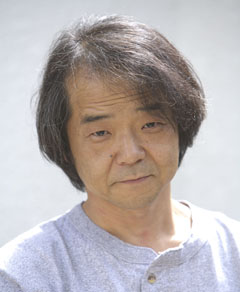Interview with Mamoru Oshii (2)
 | Mamoru Oshii Born in Tokyo on August 8, 1951, Mamoru Oshii is one of the most remarkable personalities in modern Japanese filmmaking. He introduced introspective philosophical speculation into the world of animation, influencing at the same time movie creators all around the globe with his visionary style. Oshii joined the animation industry in 1977. His main works are Urusei Yatsura 2: Beautiful Dreamer (1984) the epoch-making Ghost in the Shell (1995) and Innocence (2004, nominated for the Palme d'Or at the Festival de Cannes). Oshii has also directed a number of live-action features, including Avalon (2001). The Sky Crawlers, was nominated for the Golden Lion at the 65th Venice Film Festival, selected in the 33rd Toronto International Film Festival and was greeted with three awards at Sitges 2008. |
PART 2
Are we condemned in our escalating crave for more extreme emotions? Is there no salvation for the human race?
In the movie you can see people in a diner who are watching the live report of war operations on TV. They are men and women, old people and children. They watch war on TV as they would watch a sport event. All they see are aseptic diagrams representing the opposing armies' movements, and they are updated with the number of planes shot down at the end of the battle.
Sex and violence are two basic ingredients of cinema and entertainment in general. If you allow me the paradox, even the Olympic Games we see on TV are full of physical violence and body sensuality. But when violence is filtered and shown through a medium, it is deprived of its harshness and becomes acceptable for mass consumption.
I do believe that visual entertainment will be pursuing new, extreme limits. But if I'm asked whether there is no salvation, I can only reply that everything depends on our will -or lack of will- to enforce restrictions on these ways of expression.
For example, here in Japan animation and comics have been able to avoid strict regulations until today because they were too far from reality. But when these forms of entertainment crossed the Japanese borders, we all realized that there was a wide gap between what was acceptable for us and was not for Europe or America, even if talking about drawings and not real people. It was a formal problem.
From a cultural standpoint, though, I'll have to say that yes, probably things are as you fear they are.
The Japanese mind and lifestyle are very different from the Western ones. You have travelled and worked in America and many European countries so I'm sure you are well aware of this difference. Do you think that your movies are perceived in a different way outside of Japan, if not even misunderstood at all?
Of course they are misunderstood. In all my movies, including Ghost in the Shell and Innocence, I have always represented the relationship between human beings, unanimated things and divine with absolute Japanese sensitiveness. I hardly believe that this aspect could be understood in Europe or America.
I believe that every movie exists within the extent of its being a misunderstood object. This is even more true the very moment a movie crosses the borders of the cultural environment where it was originally conceived.
Western peoples and Japanese have a very different concept of the body. I cannot possibly expect that a movie like Innocence is received and understood in the same way in Tokyo and Los Angeles. Movies wander outside their original habitat as misunderstood objects because people in this world do not share the same values and culture. Only the entertaining part is appreciated.
Your movies are strongly influencing many Hollywood filmmakers. Is there any movie in which you were happy to recognize yourself as a source of inspiration?
I would not say "happy". I would rather say "embarrassed." When I saw The Matrix, I felt utterly embarrassed in observing how Hollywood had came to the point of rendering in live action what we had been doing in animation so far. But I have nothing against the fact that my ideas inspire other creators and are being used in their works.
Japanese animation started as a strongly Hollywood-inspired form of entertainment. I find rather interesting that Hollywood stylistic features have been filtered by Japanese creators and are now re-imported by Hollywood creators. It is a confirmation that our artists and directors have been able to get rid of this sort of cultural dependence.
Being imitated within another movie is a sort of manifestation of respect. It is always interesting to observe how some things have been interpreted and utilized. In the end, the influence is always mutual, and no movie can claim to be completely original. There's always a previous model or source of inspiration.
Personally speaking, I can only be happy if Japanese animation receives recognition abroad. We Japanese have this peculiar characteristic that makes us revere things coming from overseas. In ancient times it was from China and Korea. During the Meiji reform it was from Europe, and after WWII it was from the USA. My movie Ghost in the Shell was not fully appreciated in Japan until it became a hit in America and Europe. Having said that, I believe that animation is still regarded as a sort of second if not third rank form of filmmaking, whether in Japan or abroad. It's a prejudice that won't disappear so easily.
(2 - end)
Part of this interview was originally published on the Italian newspaper La Rebubblica on August 27, 2008. Interview by Luca Raffaelli.

![WORK LIST[DETAILS]](/contents/works/design/images/left_title.gif)



 terms of use
terms of use